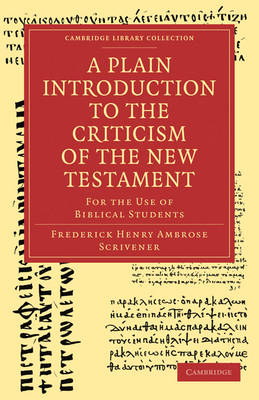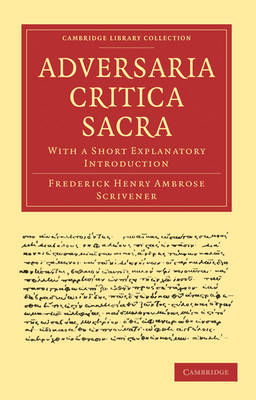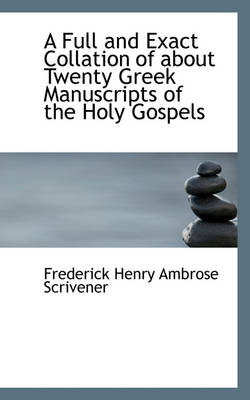Cambridge Library Collection - Biblical Studies
4 total works
A Plain Introduction to the Criticism of the New Testament
by Frederick Henry Ambrose Scrivener
Published 25 February 2010
Frederick Henry Scrivener's 1861 introduction to the textual history of the New Testament marks a key moment in the history of biblical studies. The author, a renowned biblical scholar and textual critic of his time, focuses on the central areas of his research field. These include the Greek New Testament manuscripts and their general character, early printed and later critical editions, ancient versions of the New Testament in various languages and the linguistic features of New Testament Greek. In addition, he discusses editorial principles and practice and the differing approaches that had recently been adopted, and gives examples of their application to actual New Testament passages. Originally intended for readers with no previous knowledge of this subject, and carefully organised so as to be accessible to them, the book is still of interest to upper-level students and to historians of the discipline.
Published posthumously in 1893, Frederick Scrivener's Adversaria Critica Sacra remains a volume of key importance to biblical scholars today, representing Scrivener's remarkable accuracy in his study and collation of manuscripts. During an age when many manuscripts were being newly discovered, and New Testament textual criticism was a rapidly developing field, Scrivener's collations played an important role in highlighting and making available the many different readings in existence. The book presents sixty-three manuscripts containing all or part of the Greek New Testament, including twenty which contain the Gospels in whole or in part, fifteen Lectionaries (Greek Church Lesson-books), five copies of Acts and the Catholic Epistles, and ten which are collations of the earliest printed editions of the Greek New Testament. Scrivener provides an informative general account of each manuscript, and an estimate of their respective critical values.
A Full and Exact Collation of about Twenty Greek Manuscripts of the Holy Gospels
by Frederick Henry Ambrose Scrivener
Published 24 January 2009
The first major publication by the distinguished biblical scholar Frederick Henry Scrivener, this is a collation of twenty-three Greek manuscripts of the gospels. The Greek text is preceded by detailed introductory chapters in English, illustrating Scrivener's criteria for selecting the manuscripts, the methods he adopted to edit and collate the texts, and his critique of contemporary biblical scholarship. The introduction also provides comprehensive background information for each of the manuscripts, including details on location, condition and the likely date of origin, and offering valuable context for any study of the texts. First published in 1853, at a time when many ancient manuscripts were being rediscovered, this landmark book will fascinate all those interested in biblical textual studies and the history of the Greek Bible.
The Authorized Version of the English Bible (1611)
by Frederick Henry Ambrose Scrivener
Published 21 October 2010
F. H. A. Scrivener (1813-1891) was educated at Trinity College, Cambridge, and published a variety of works of New Testament scholarship while working as a clergyman and headmaster. At a time when new manuscripts of New Testament texts were being discovered, his skills as a transcriber and collator of these texts were greatly respected. This volume is his critical examination of the King James Bible which chronicles the history of the Bible's various editions and the evolution of the text. Scrivener reviews the various groups involved in translating and revising the Bible. A detailed discussion of the use of grammar and punctuation is included, as well as appendices listing all variations and amendments occurring between the different editions. Considering the King James Bible from both historical and linguistic perspectives, this volume provides a valuable overview of a translation that has been influential for four centuries.



